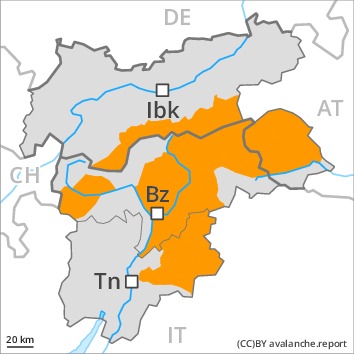
Danger level
 | 2500m
|
Avalanche Problem
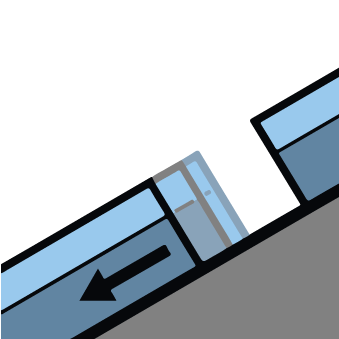 | | Gliding snow |
|  | |  |
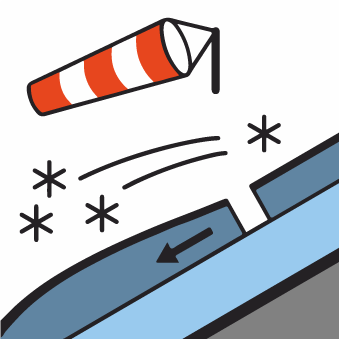 | | Wind-drifted snow |
|  | |  |

On steep grassy slopes natural avalanches must be expected. Fresh wind slabs require caution.
On steep grassy slopes gliding avalanches are possible at any time, even large ones. This applies in particular on steep sunny slopes below approximately 2500 m. Exposed parts of transportation routes can be endangered. Areas with glide cracks are to be avoided.
The new snow and wind slabs of the last few days can be released by a single winter sport participant in all aspects above the tree line.
In very isolated cases avalanches can be triggered in deep layers of the snowpack and reach very large size. This applies in case of releases originating from very steep starting zones at high altitudes and in high Alpine regions that have retained the snow thus far, especially at transitions from a shallow to a deep snowpack, this applies in particular in case of a large load.
The current avalanche situation calls for experience in the assessment of avalanche danger.
Snowpack
dp.2: gliding snow
dp.6: cold, loose snow and wind
As a consequence of the moderate to strong southwesterly wind, fresh snow drift accumulations formed on Friday, in particular on near-ridge shady slopes. In some cases the various wind slabs have bonded poorly together. This applies at high altitudes and in high Alpine regions. The somewhat older wind slabs are covered with new snow in some cases and therefore difficult to recognise. Towards its surface, the snowpack is soft and its surface consists of surface hoar. Faceted weak layers exist deep in the old snowpack in particular at high altitudes and in high Alpine regions. Naturally triggered avalanches and artificially triggered avalanches have confirmed the unfavourable bonding of the snowpack. Towards its base, the snowpack is moist, in particular at low and intermediate altitudes.
Tendency
The weather effects will bring about a gradual change towards better conditions. Caution is to be exercised in areas with glide cracks.
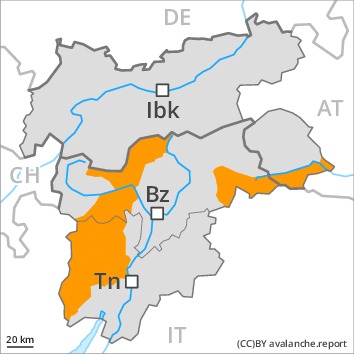
Danger level
 | 2500m
|
Avalanche Problem
 | | Gliding snow |
|  | |  |
 | | Wind-drifted snow |
|  | |  |

On steep grassy slopes natural avalanches must be expected. Fresh wind slabs at high altitude.
On steep grassy slopes gliding avalanches are possible at any time, even very large ones in isolated cases. This applies in particular on steep sunny slopes below approximately 2500 m. Exposed parts of transportation routes can be endangered.
The new snow and wind slabs of the last few days can be released, especially by large additional loads, in all aspects above the tree line. The avalanche prone locations are sometimes covered with new snow barely recognisable, even to the trained eye.
The current avalanche situation calls for experience in the assessment of avalanche danger.
Snowpack
dp.2: gliding snow
dp.6: cold, loose snow and wind
Over a wide area 100 to 250 cm of snow, and even more in some localities, has fallen since Friday. At low and intermediate altitudes a lot of snow is lying. Towards its base, the snowpack is moist, in particular at low and intermediate altitudes.
In some cases the various wind slabs have bonded poorly together. This applies at high altitudes and in high Alpine regions. The more recent wind slabs are covered with new snow in some cases and therefore difficult to recognise. The covering of new snow is fairly homogeneous and has a loosely bonded surface.
Tendency
The weather effects will bring about a gradual change towards better conditions. Caution is to be exercised in areas with glide cracks.
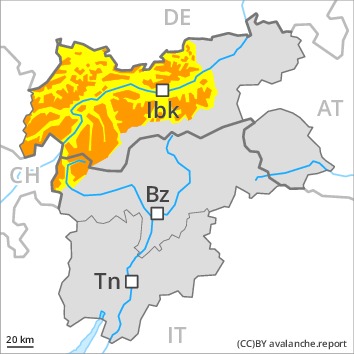
Danger level
 | treeline
|
Avalanche Problem
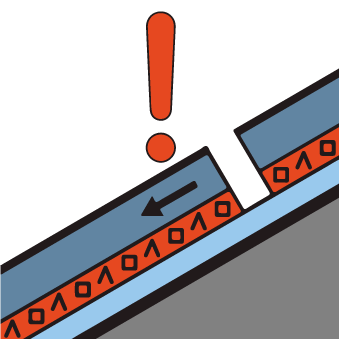 | | Persistent weak layer |
|  | |  |
 | | Wind-drifted snow |
|  | |  |

Wind slabs and weakly bonded old snow represent the main danger.
Weak layers in the old snowpack can be released by individual winter sport participants, caution is to be exercised in particular on steep shady slopes above the tree line, as well as on steep sunny slopes above approximately 2500 m. In isolated cases avalanches are large.
In addition the fresh wind slabs should be taken into account, in particular adjacent to ridgelines and in gullies and bowls above the tree line. The number and size of avalanche prone locations will increase with altitude. The fresh and somewhat older wind slabs are covered with new snow in some cases and therefore difficult to recognise.
On steep grassy slopes gliding avalanches are possible, in particular medium-sized ones, especially on very steep sunny slopes below approximately 2500 m.
The current avalanche situation calls for experience in the assessment of avalanche danger and careful route selection.
Snowpack
dp.1: deep persistent weak layer
dp.6: cold, loose snow and wind
Towards its surface, the snowpack is fairly homogeneous and has a loosely bonded surface. In the last few days avalanche prone wind slabs formed above the tree line. As a consequence of the southwesterly wind, the snow drift accumulations have increased in size on Friday, in particular on near-ridge shady slopes.
The old snowpack will be weakly bonded in some places. Main Alpine Ridge and to the north: Avalanches triggered by explosives and stability tests confirm the existence of a weak snowack on steep shady slopes, especially at high altitudes and in high Alpine regions. Whumpfing sounds and the formation of shooting cracks when stepping on the snowpack can indicate the danger.
Tendency
The avalanche danger will persist.
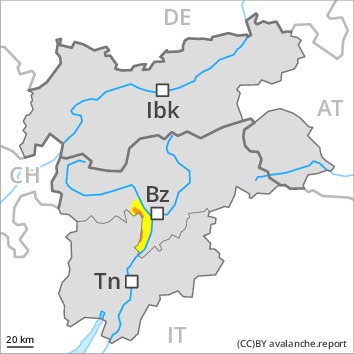
Danger level
 | treeline
|
Avalanche Problem
 | | Wind-drifted snow |
|  | |  |
 | | Gliding snow |
|  | |  |

Fresh wind slabs require caution. More gliding avalanches are possible.
The fresh wind slabs are to be evaluated with care and prudence in particular on west to north to east facing aspects above the tree line.
On steep grassy slopes gliding avalanches are possible at any time, even medium-sized ones. This applies on sunny slopes below approximately 2500 m.
Ski touring calls for experience in the assessment of avalanche danger and careful route selection.
Snowpack
dp.2: gliding snow
dp.6: cold, loose snow and wind
Over a wide area over a wide area 100 to 150 cm of snow has fallen since Friday. In some cases the various wind slabs have bonded still only poorly together. These are covered with new snow in some cases and therefore difficult to recognise. Towards its base, the snowpack is moist, in particular at low and intermediate altitudes.
Tendency
The avalanche danger will persist.















